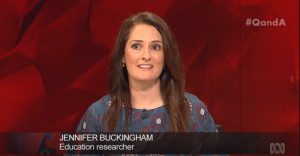Home » Commentary » Opinion » Q&A focuses on difference, not agreement
· Ideas@TheCentre
 The ABC’s Q&A program is a curious beast. Even when there is broad agreement among panel members about numerous matters, the focus is on their differences of opinion. And so it was on Monday night, when I was on the panel for a ‘teaching’ special.
The ABC’s Q&A program is a curious beast. Even when there is broad agreement among panel members about numerous matters, the focus is on their differences of opinion. And so it was on Monday night, when I was on the panel for a ‘teaching’ special.
Despite this being the theme, there was inevitably a question about school funding. Most of the panel acknowledged the fact that although socioeconomic and educational disadvantage is more prevalent in the public school sector, it is not confined to there — and there was unanimous agreement that need is an important principle for school funding. Public school teacher Eddie Woo and former public school and Catholic school teacher Gabbi Stroud shared my positive view on school choice.
However, the questions from the audience were mostly pertinent to the teaching theme — Australia’s low standards of maths achievement and low participation in higher level maths, whether it makes sense to model Australia’s education system on Finland’s given their starkly different demographic and cultural contexts, how to elevate the status of teaching, and whether standardised testing is changing the nature of school education.
This is where things became highly charged. My opinion on standardised testing is that — used judiciously — it provides an essential objective reference point for parents, researchers and schools to assess student achievement and progress. Teacher judgement is not consistent or infallible.
Gabbi Stroud has recently published a memoir on her experiences of being a teacher and puts NAPLAN at the top of her list of reasons for leaving the profession. Her response was emotive, blaming standardised testing for causing harmful levels of stress for teachers and students, and for damaging education. It is hard not to feel sympathy for someone who feels such personal despair about her decision to leave her chosen career. But we cannot lose sight of the fact that schools are for children, not for teachers. Yes, it is important for teachers to be valued and respected but for teaching to be truly regarded as a profession there must be accountability.
Right now, one in four students leaves school barely literate. When that number gets close to zero, I will celebrate the abolition of NAPLAN with elation.
Q&A focuses on difference, not agreement